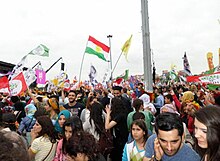
The Kurdish Political Movement or the Kurdish Liberation Movement,[1][2] refers to the movement that seeks to realize the political demands of Kurdish people living in the geocultural region called Kurdistan[3] in the lands of Turkey, Iraq, Syria and Iran, such as education in their native language, self-determination, autonomy or an independent state.[4][5][6] In the context of Turkey, this movement is being pursued by democratic means through left-wing ethnic political parties, as well as through PKK affiliated militant groups.
After the switch to Turkey's multi-party era in 1945, several Kurdish ethnic parties have been established. The first Kurdish minority interests party came into the political arena in 1990 with the establishment of the People's Labour Party (HEP), which was banned by the court in 1993 for being a source of separatism.[7] Parties that advocate for Kurdish interests have since been ephemeral, often participating in one or two elections before being banned by the Constitutional Court, only to re-organize under another political party. This was also a recurring theme within the HEP tradition.
The Kurdish-interests movement in Turkey's political arena has been controversial, with many condemning the movement as a pathway for separatism and platform for pro-PKK ideologues.[8] While the PKK does not have a structural relationship or hierarchical control over parties like the People's Democratic Party, HDP, they have aligning political visions, interpersonal and familial ties, and a shared experience of political repression.[9] On the other hand, these ties have heavily fostered the discourse that Kurdish-interest parties "carry terrorists into the parliament" and has influenced not only the legitimacy of these parties but has also shaped the campaigning and electoral behaviors of other actors.[10]
Another systematic struggle the Kurdish political movement used to face was the 10% electoral threshold. Minority Rights International, a U.K.-based non governmental organization, has stated that the 10% threshold prevents minority parties’ representation in the political arena. Their 2007 report highlights the fact that while pro-Kurdish parties have consistently acquired the highest percentage of votes in areas the Kurdish population is concentrated in, they have failed to reach the national 10% threshold.[11] Since 2015, Kurdish-interest parties, starting with the HDP, have been able to poll above the threshold in general elections by successfully courting Turkish leftists.[12] In 2022 this threshold was lowered to 7%.
| Name | Short | Leader | Active |
|---|---|---|---|
| People's Labor Party | HEP | Ahmet Fehmi Işıklar | 1990–1993 |
| Freedom and Equality Party | ÖZEP | 1992 | |
| Freedom and Democracy Party | ÖZDEP | Mevlüt İlik | 1992–1993 |
| Democracy Party | DEP | Yaşar Kaya | 1993–1994 |
| People's Democracy Party | HADEP | Murat Bozlak | 1994–2003 |
| Democratic People's Party | DEHAP | Tuncer Bakırhan | 1997–2005 |
| Democratic Society Movement | DTH | Leyla Zana | 2005 |
| Democratic Society Party | DTP | Ahmet Türk | 2005–2009 |
| Peace and Democracy Party | BDP | Gültan Kışanak, Selahattin Demirtaş | 2008–2014 |
| Peoples' Democratic Party | HDP | Sultan Özcan, Cahit Kırkazak | 2012–present |
| Democratic Regions Party | DBP | Çiğdem Kılıçgün Uçar, Keskin Bayındır | 2014–present |
| People's Equality and Democracy Party | DEM | Tülay Hatimoğulları Oruç, Tuncer Bakırhan | 2023–present |
- ^ Aydınoğlu, E. Kürt Özgürlük Hareketi, Versus Yayınevi, 2004 ISBN 9786054972166
- ^ Barzani, M., İnce, V. Barzani ve Kürt ulusal özgürlük hareketi, Doz, 2003.
- ^ "Kurdistan." Encyclopædia Britannica. 2008. Encyclopædia Britannica Online. 06 Ekim 2008 <http://www.britannica.com/EBchecked/topic/325241/Kurdistan Archived 27 November 2011 at the Wayback Machine>.
- ^ Öcalan, A. Kürdistan'da Kadın ve Aile, Weşanên Serxwebûn, 1993. Archived 2016-01-28 at the Wayback Machine
- ^ Marcus, A., Alkan, A. Kan ve inanç: PKK ve Kürt hareketi., İletişim Yayınları, 2009.
- ^ Syria, P. A. Esad Sonrası Suriye: Irak ve Lübnan’ın Öğrettikleri Archived 24 December 2012 at the Wayback Machine, Ortadoğu Analiz, 2012, cilt 4, sayı 47.
- ^ "Halkın Emek Partisi – MİLLİYET GAZETE ARŞİVİ". 2015-02-04. Archived from the original on 4 February 2015. Retrieved 2021-04-25.
- ^ Watts, Nicole F. (1999). "Allies and Enemies: Pro-Kurdish Parties in Turkish Politics". International Journal of Middle East Studies. 31: 631–656. doi:10.1017/S0020743800057123. JSTOR 176465. S2CID 155216330 – via JSTOR.
- ^ O'Connor, Francis (Researcher on Kurdish and Turkish politics) (2017). The Kurdish movement in Turkey : between political differentiation and violent confrontation. Peace Research Institute Frankfurt (PRIF). ISBN 978-3-946459-21-7. OCLC 1051056786.
- ^ Kibris, Arzu (2010-10-04). "Funerals and Elections: The Effects of Terrorism on Voting Behavior in Turkey". Journal of Conflict Resolution. 55 (2): 220–247. doi:10.1177/0022002710383664. ISSN 0022-0027. S2CID 16293194.
- ^ International., Minority Rights Group (2007). A quest for equality : minorities in Turkey. Minority Rights Group International. ISBN 978-1-904584-63-6. OCLC 192073088.
- ^ McKernan, Bethan (27 December 2020). "Turkey: the rise and fall of the Kurdish party that threatened Erdoğan". The Guardian.